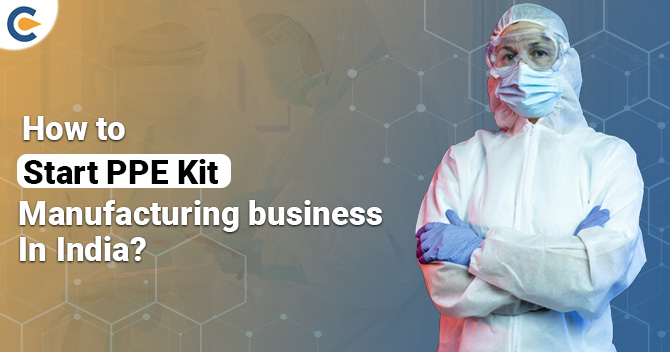The demand for PPE kits had witnessed a considerable spike during the covid-19 phase. Previously, the applicability of the PPE kits was limited to the medical sector only, but after the advent of the Covid-19, its utilization has been extended in other sectors as well, where health and safety are the primary concern. India has never encountered such a production crisis regarding PPT kits because of this unexpected catastrophe. Many nations like Germany, the US, France, and India felt the shortage of Personal Protection Equipment kits & therefore took it as a daunting task to manufacturer their own kits & the result is that is has been producing enough kits for the local and international market. Factually, the growth potential of this sector is enormous, and it will continue to strengthen over time owing to the ever-rising demand in the local and international market. If you have a keen interest in this domain and you wish to start your business journey as a PPE kit manufacturer, then you are on the right page. This write-up will help you set up a legally viable PPE kit manufacturing business in India.
What do you mean by PPE kits?
Personal Protective Equipment (aka PPEs) refers to safety gears designed to protect the health of individuals by reducing exposure to a biological agent. PPEs include a face shield, goggles, mask, gloves, gowns, shoe cover, and headcover.
Read our article:Approvals Required to Meet the Requirement of Face Mask and PPE Kit License
Why is PPE Kit Manufacturing Business Proliferating in the present time?
The impetus of growth of the PPE sector was relatively lower in the pre-covid era owing to the limited demand in the domestic market. But, the demand for the same was skyrocketed after the advent of the coronavirus pandemic, which led to the disruption of supply chain management. This compelled the government to establish some production units on a prompt basis. Consequently, today India produces more the 5 lakh PPE kits on a per-day basis. That means that the demand for PPE kits is surging rapidly, and more and more startups need to step into this business domain.
A Comprehensive Business Model for PPE Kit Manufacturing Unit
The section below entails the definitive blueprint of setting up a legally sustainable PPE Kit manufacturing unit in India:
Step 1: Identify Key Markets
It is apparent you will need to identify the potential markets for your product before commencing the manufacturing process. The GOI has establishment various promotion councils that help entrepreneurs access potential markets without investing a fortune.
Based on the type of your product portfolio, you can pinpoint the relevant market. You can also leverage various sources available online to determine the key markets on a product-wise basis.
Another alternative is to appoint a trusted marketing agency that directly sells products to the local market as well as retailers. It is all based on the scale of your production and your target end-users. Of course, most of these things also rely on the investment you have made.
As a part of general marketing tactic, prefer targeting markets that have a low number of competitors and high growth potential. This way, you can ensure improved Return over investment, i.e. ROI and solidify the chances of further expansion.
Step 2: Jot downs the finances required to start the facility
Anyone who wishes to venture into the PPE kits manufacturing business can start with minimal investment, courtesy of the various government-based schemes and incentives. In general, one can get engaged with this business model with an investment ranging from 2 lakhs to 50 lakhs depending on the scope of operation and type of product.
Additional factors that affect the investment include machines required, manufacturing, workforce, transportation, marketing, etc. One can get in touch with a field expert to get better clarity on the investment needed to kick-start a PPE kit manufacturing kit.
Step 3: Locate an Apt Manufacturing Location
You don’t necessarily have to arrange a large area for producing PPE kits in India. One can get started with PPE manufacturing in a moderately-sized plant that measured 500 sq ft. One needs to fuel the plant with basic amenities such as groundwater connection, electricity, proper drainage, waste management so on to kick start the production process.
As per the general business strategy, begin your search in areas that are in close proximity to your target marketplace. This is the best way of mitigating surging transportation expenses that eventually hamper the final pricing of your products.
Step 4: Procure Relevant Equipment for Manufacturing
Generally, one needs to procure different types of machinery to produce a wide portfolio of PPE gears. And the cost for the same will also depend on the scope of your operation and production volume. Contact trusted suppliers if you want to start a full-fledged and fully automatic plant.
Procuring semi-processed raw materials is one of the most economical ways to starting the production operation. This form of production strategy offers two significant benefits:
- First, you do not have to invest heavily in raw material procurement
- Second, it helps increase the production volume whenever the demand spike up.
Step 4: Determine the type of raw materials for the manufacturing process
Following is the detailed snapshot of raw materials which is required to manufacture the wide range of PPE gears in India:
N95 Masks: Melt blown non-woven fabric manufactured via extruding silicon, plastic, and rubber along with thread to stitch it.
There is a process used to impart shape to the PPE gear like a mask, and then it is fitted with material that enables breathing. It also undergoes series of testing for security standards. Non-woven polypropylene is a widely used raw material.
Face Shields and Goggles: Face shields entail a glass shield with a metal and a visor. The common raw materials used to produce face shields include;
- Plastic polycarbonate
- Polyvinyl chloride
- Acetate
- Propionate and PETG
Gowns: Gowns are produced from an array of raw materials based upon their use. These materials help prevent the intrusion of potential viruses. Some of the raw materials used to produce gowns include polyester, synthetic, non-woven fabric, polypropylene, etc.
Gloves: Hand gloves are radically produced from plastics, rubber, latex rubber or nitrile etc.
Step 5: Obtain Company incorporation
The Ministry of Corporate Affairs regulates the company registration in India in the purview of the Companies Act, 2013, & the Companies Incorporation Rules, 2014. In legal parlance, the term “Company” refers to an entity incorporated under the said Act or under any previous bylaws.
The government acknowledges a company as a separate legal entity from a legal standpoint. Company is one of the popular ways to secure a legal identity for your business. The first and foremost requisite is to opt for an apt business structure from the following
- One Person Company (OPC)
- Private Limited company
- Public limited company
The choice of the apt business form will affect various factors from your business name to your liability, to your tax obligations and dues. The financial & operational success of the company primarily revolves around the business structure you choose.
Step 6: Secure Mandatory Licenses for PPE Kit Manufacturing plant
Since the majority of the articles that are available in the PPE kits are more or less medical instruments thus, producing and trading of such articles seek stringent standards. Central Drugs Standard Control Organization (aka CDSCO) administers and governs the production of such articles, and thus it is compulsory to register under this same.
Within 18 months of registration, the government[1] authorities will make some quality checks of the products after the production phase. The BIS also governs the products’ standards & thus, one needs to comply with the same as well. BIS renders certification for the product to be sold in the marketplace.
One can also go through the norms underpinned by the Ministry of Textiles & Ministry of Health that is administering the fabric used in producing these articles. Some fall under the regime of the Drugs and Cosmetics Act, while others come under textiles.
To sum up, you will be required to obtain the following licenses to legally operate PPE manufacturing business in India:
- Drug and Cosmetic license granted by CDSCO
- BIS registration for product standardization
- Factory license granted by Labour department of the respective state
- NOC from State Pollution Control Board
- CE certification (if products are proposed to be shipped to European Union)
- Import-Export License (for Shipping product abroad)
Conclusion
The best thing about the PPE kit manufacturing business is that it is in the primary stage of growth, which indeed is a great thing from the startups’ standpoint. This is a kind of business model that seeks minimal to moderate investment depending on the scope of operation.
Read our article:What is the Procedure for Start-up Registration India?











